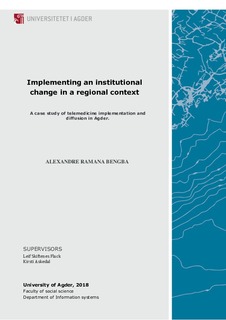| dc.description.abstract | High life expectancy, aging population and an increasing chronic diseases generates new challenges for the current global healthcare (Brouard, Bardo, Vignot, Bonnet, & Vignot, 2014). Public agencies and business corporates have shown interest inadvances technological research and innovation projects to remedy the problem. Innovating in public sector is highly challengingand results shouldn’t be taken for granted (Dacin, Goodstein, & Scott, 2002). Further, there is a lack of understanding how public innovations are created (Sørensen & Torfing, 2011). Theoretically the thesis builds on two strands of theories: institutional entrepreneurship and eHealth. This thesis builds on theassumption that if disposing enough knowledge on institutional entrepreneurship work, public entrepreneurs may be able to plan, organize and facilitate project success. This thesis focuses on “change agents” who initiate divergent changes defined as changes that break the institutional status quo in a field of activity and thereby possibly contribute to transforming existing institutions or creating new ones’(Battilana, Leca, & Boxenbaum, 2009). To investigate how public innovations are created, thefollowing research question was formulated:What are the critical factors enabling institutional entrepreneurs to create and sustain a technological innovation project in regional healthcare context?Built on a qualitative case study research, a total of 11in-depth,thematic interviews were conducted with actors involved in developing a common telemedicine solution for Agder. The results show how challengingit is to implement change in established organizations. Empirical data indicate that the process of implementing institutional change in a regional context involves a multi-dimensional process of institutional entrepreneurship work including political work, technical work and cultural work. Further, the findingsreveal that stakeholder management and a predisposed organizational structure and capabilities are critical factors enabling successful institutional change in large scale health projects. This research adds to the existing institutional entrepreneurship literature by suggesting toaddstakeholder management.Keywords: Institutional change, institutional entrepreneurship, institutional entrepreneurship work, innovation inpublic sector, eHealth, telemedicine | nb_NO |

